December 13, 2024
Scholars, parents express their thoughts in a Humanity class on filial piety
By Joy Rojas
A lively, thought-provoking discussion on filial piety capped Tzu Chi scholars’ monthly Humanity classes for 2024.
Held on December 8 at the Jing Si Auditorium of Buddhist Tzu Chi Campus (BTCC), Sta. Mesa, Manila, the class was scheduled with the quarterly Charity Day for medical assistance beneficiaries. Parents who were in the audience were as eager as the scholars to voice their thoughts on a theme that is important to Dharma Master Cheng Yen.
“There are two things in life that cannot wait,” reminds the Tzu Chi founder. “Filial piety and doing good deeds.”
As the guest speaker, former Tzu Chi scholar-turned-Tzu Chi Youth and volunteer Jamil Q. Carvajal focused his discussion on filial piety in the Philippine setting. “How do Filipinos express gratitude and love? Through words? Actions?” says Carvajal, a teacher by profession. “It became an interactive discussion and I tried my best to cater to the points of view of both the children and parents.”
Admittedly, filial piety, or respect for one’s parents and elders, is easier said than done, especially among families facing challenges in the home. What if a father is addicted to gambling, or a mother shows more affection towards her children from her new partner?
Both parents and scholars also raised a longstanding issue among generations of Filipino families. Is it still a parent’s job to support a child who has graduated, found a job, and has a family of his own? Conversely, is an adult child responsible for her aging parents?
That many Filipinos live with their multigeneration and extended family members under one roof explains why parents remain very much a part of their grown children’s lives. And while Filipinos are slowly opening up to the idea of turning over their elderly parents to a nursing home, a vast majority still accept the fact that they will one day be in charge of their parents’ welfare.
Medical assistance beneficiary Roberto Evangelista, who has a pending surgery for his abdominal aorta aneurysm, was not in the best of health when he looked after his ill mother. “I cared for her 24/7. I did everything,” says Evangelista, an only child. “That’s all I could do for my parents. Even when I was sick, I felt the importance of obedience, respect, and love for them.”
“I’m not a parent but my understanding of what parents need from their children is based on my own experience,” says Carvajal. “For me, my filial piety towards my parents is my single-blessedness, which allows me to support them financially, and help in my siblings’ upbringing.”
For families with rocky relationships, Carvajal believes filial piety can be achieved in time with forgiveness and understanding. “One way of showing love is by forgiving and understanding the people who have disappointed you or done you wrong,” he says. “But don’t hold on to the desire to forgive or love right away. We’re all a work in progress, and someday we’ll eventually realize our own shortcomings and be ready to forgive.”
Ultimately, it all boils down to communication. “Children and parents should talk and listen to each other, so they can resolve any shortcomings and misunderstandings,” he says. “Don’t discuss personal matters on social media. Resolve it together, as a family, in the home. That, to me, is filial piety.”
The class was followed by Tzu Chi scholars’ annual Christmas Carol Contest, and ended with scholars and medical beneficiaries claiming their rice allowance (20-kg for medical beneficiaries, 10-kg for scholars) and groceries before relaxing to a vegetarian lunch at the BTCC plaza. Everyone went home not only with material things for the coming Christmas celebration but also precious life lessons that will last a lifetime.
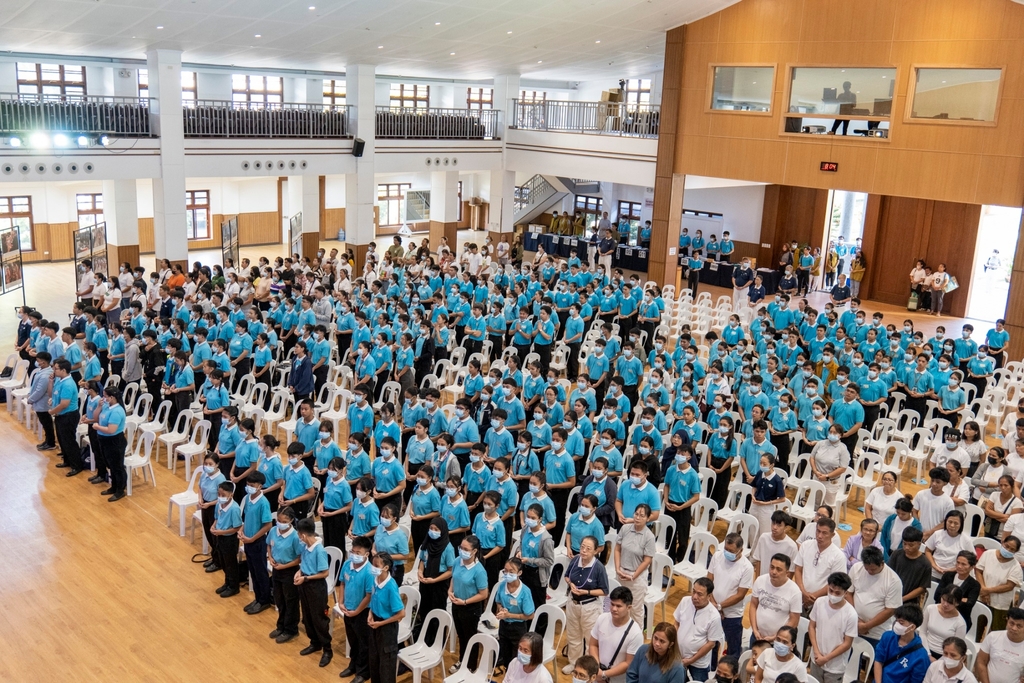 A joint Humanity class for Tzu Chi scholars and Charity Day for medical assistance beneficiaries was held on December 8 at the Jing Si Auditorium. Over 500 scholars and patients attended the event.
A joint Humanity class for Tzu Chi scholars and Charity Day for medical assistance beneficiaries was held on December 8 at the Jing Si Auditorium. Over 500 scholars and patients attended the event.
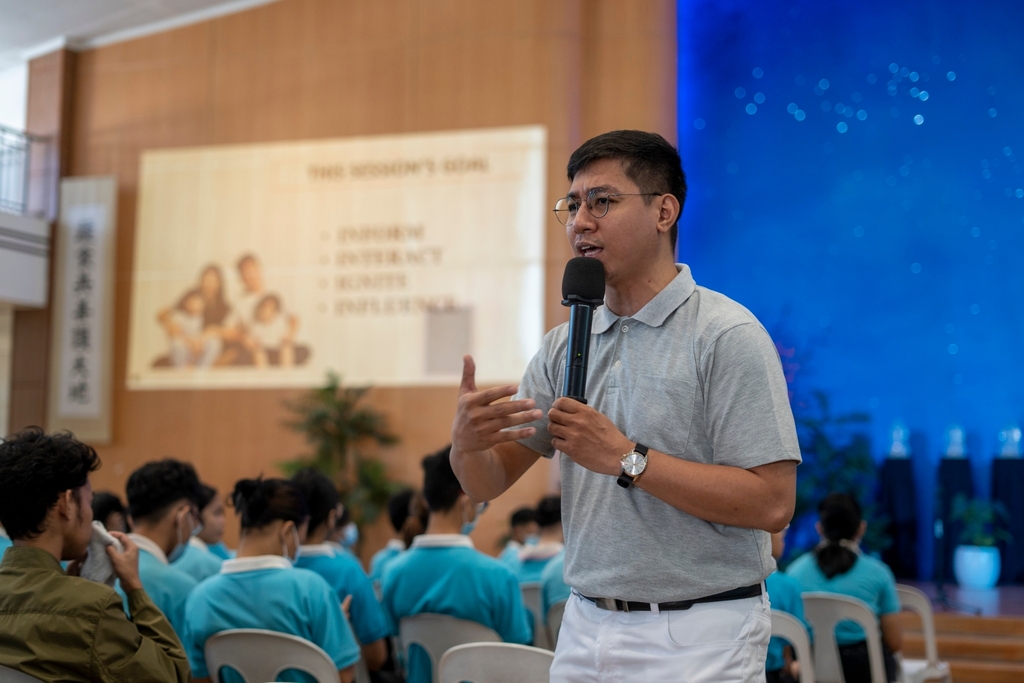 Former Tzu Chi scholar-turned-Tzu Chi Youth and volunteer Jamil Q. Carvajal led the Humanity class on filial piety.
Former Tzu Chi scholar-turned-Tzu Chi Youth and volunteer Jamil Q. Carvajal led the Humanity class on filial piety.
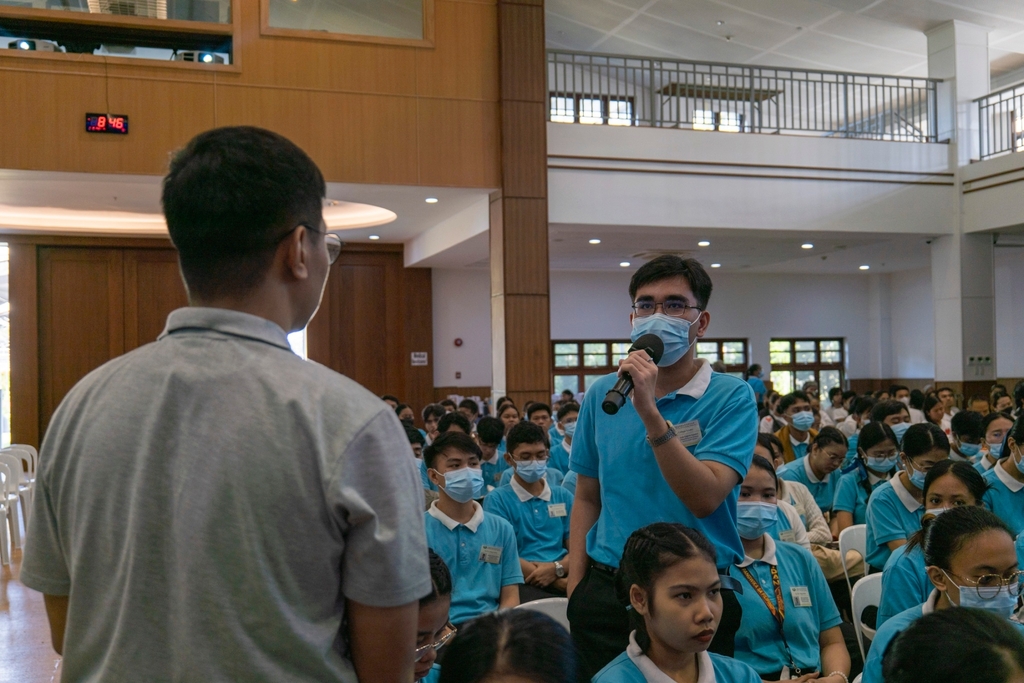 Tzu Chi scholars and parents among the medical assistance beneficiaries expressed their sentiments on filial piety or respect for parents and elders.
Tzu Chi scholars and parents among the medical assistance beneficiaries expressed their sentiments on filial piety or respect for parents and elders.
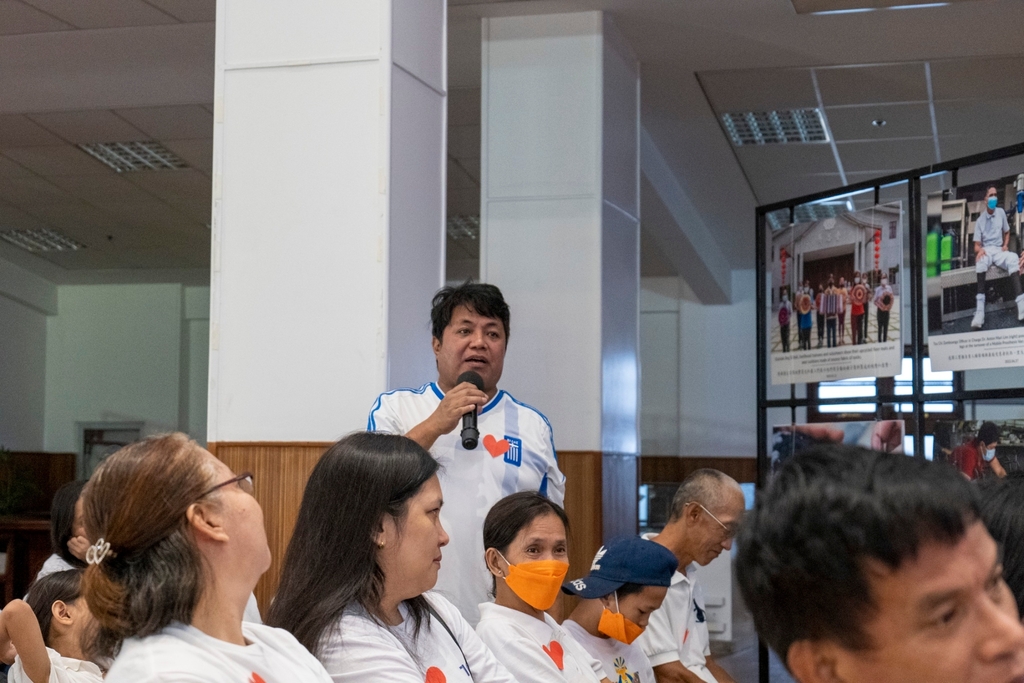 Tzu Chi scholars and parents among the medical assistance beneficiaries expressed their sentiments on filial piety or respect for parents and elders.
Tzu Chi scholars and parents among the medical assistance beneficiaries expressed their sentiments on filial piety or respect for parents and elders.
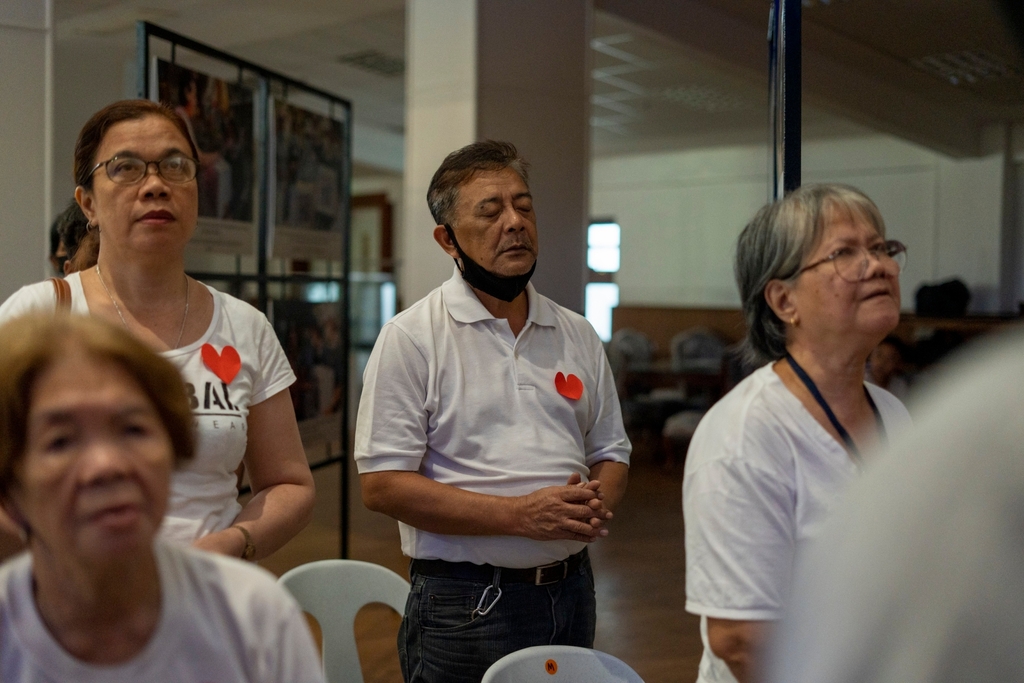 Medical assistance beneficiary Roberto Evangelista (center) didn’t think twice about looking after his ill mother, despite his own health concerns. “That’s all I could do for my parents. Even when I was sick, I felt the importance of obedience, respect, and love for them.”
Medical assistance beneficiary Roberto Evangelista (center) didn’t think twice about looking after his ill mother, despite his own health concerns. “That’s all I could do for my parents. Even when I was sick, I felt the importance of obedience, respect, and love for them.”
 Pamantasan ng Lungsod ng Maynila alumnus Jamil Q. Carvajal (right) encourages fellow PLM-er Christine Joy Cabuello to share her thoughts on filial piety.
Pamantasan ng Lungsod ng Maynila alumnus Jamil Q. Carvajal (right) encourages fellow PLM-er Christine Joy Cabuello to share her thoughts on filial piety.
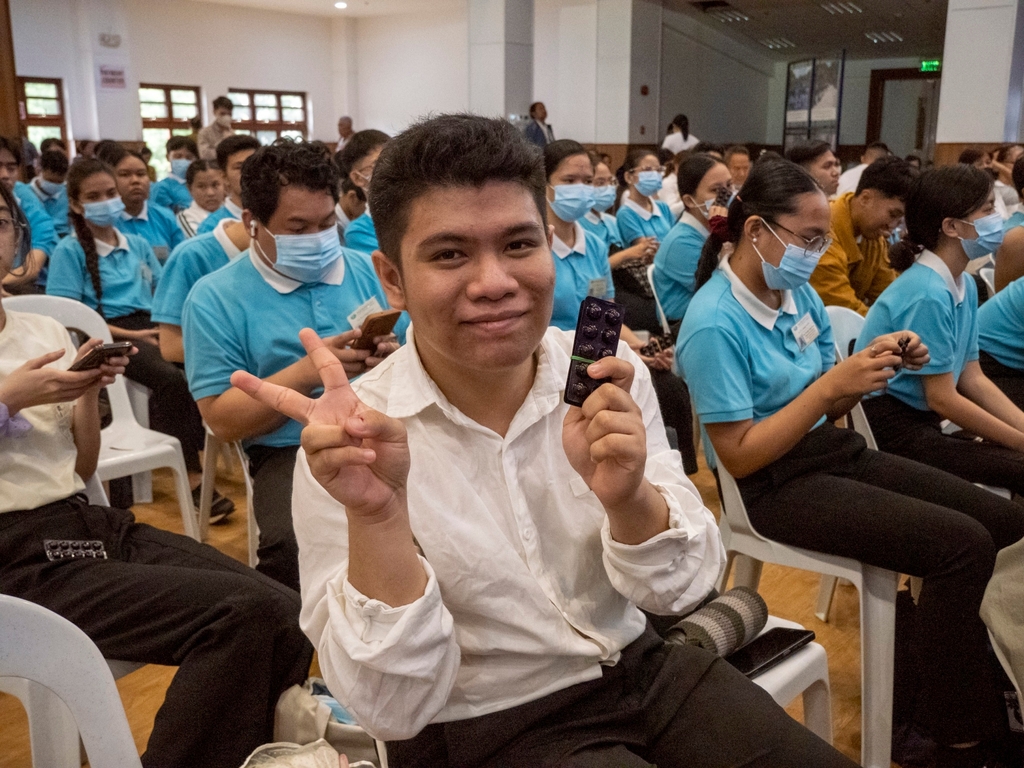 Leandro Peter Joshua C. Taton, a fourth year BS Values Education student from Philippine Normal University, is part of a research paper that asks if looking after one’s aging parents is “utang na loob” or a debt of gratitude done out of obligation. “To us, it’s the willingness to help out of our own volition,” he says.
Leandro Peter Joshua C. Taton, a fourth year BS Values Education student from Philippine Normal University, is part of a research paper that asks if looking after one’s aging parents is “utang na loob” or a debt of gratitude done out of obligation. “To us, it’s the willingness to help out of our own volition,” he says.
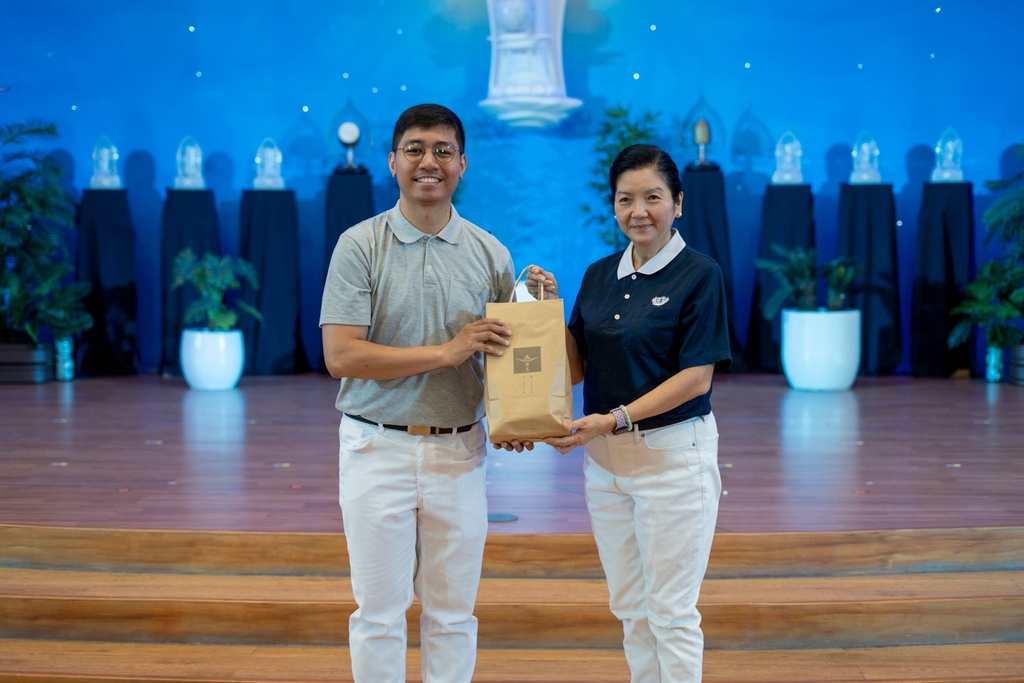 After the discussion, Jamil Q. Carvajal received a token of appreciation from Tzu Chi Education Committee Head Rosa So.
After the discussion, Jamil Q. Carvajal received a token of appreciation from Tzu Chi Education Committee Head Rosa So.
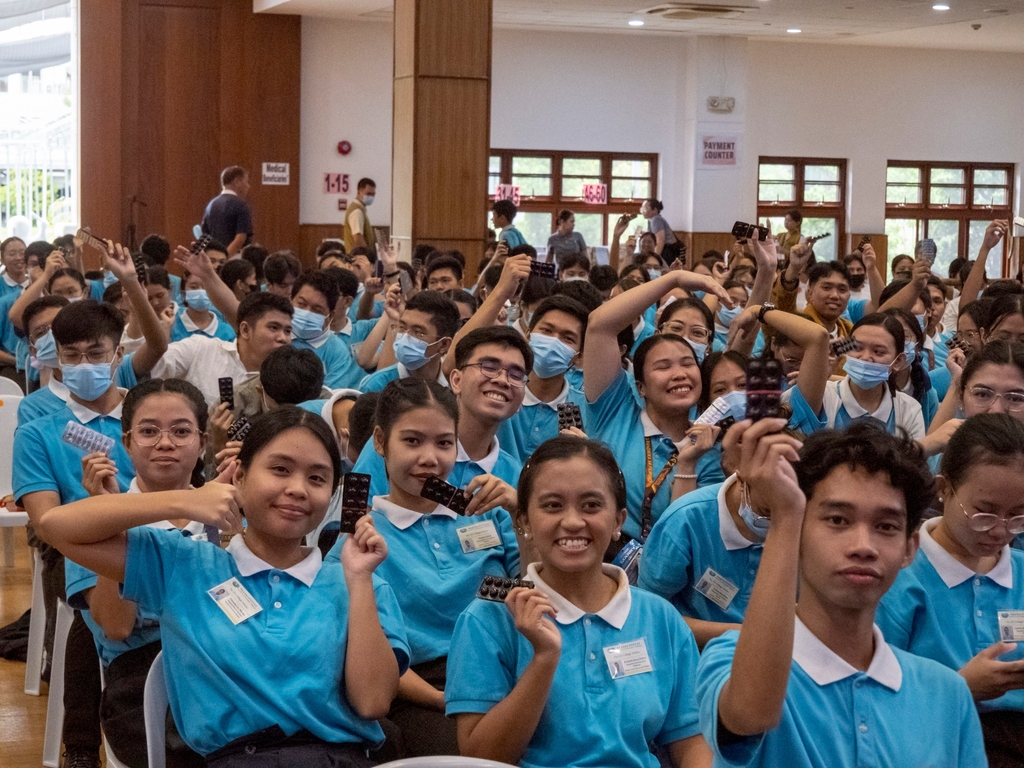 Tzu Chi scholars wave the packs of vitamins they received from a generous sponsor.
Tzu Chi scholars wave the packs of vitamins they received from a generous sponsor.
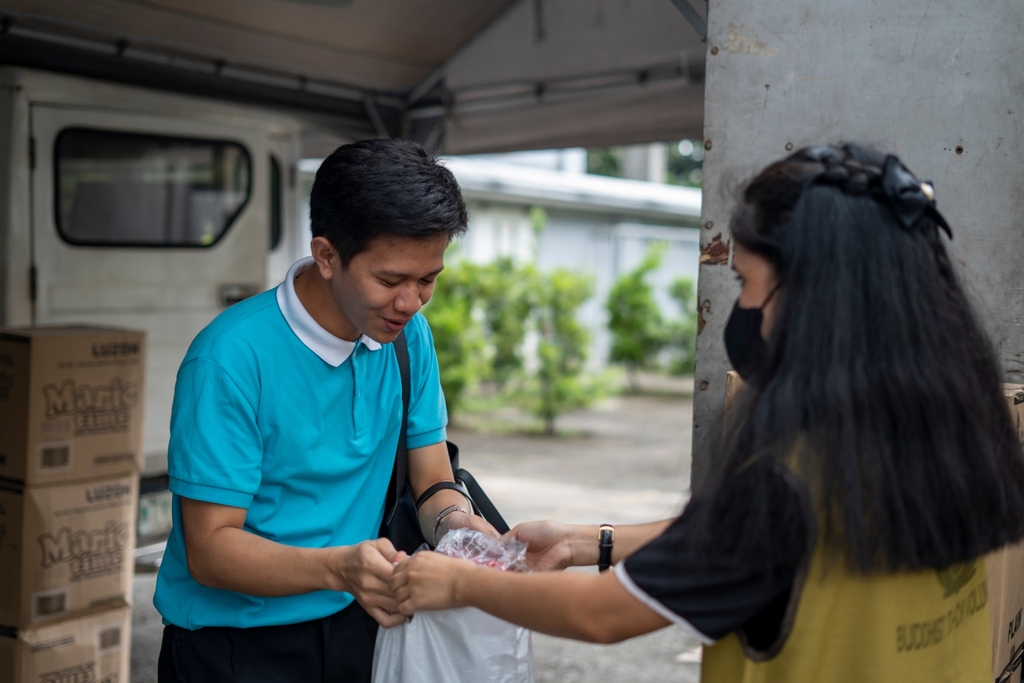 Tzu Chi scholars and beneficiaries received their respective rice allowance and a bag of assorted groceries after Humanity class.
Tzu Chi scholars and beneficiaries received their respective rice allowance and a bag of assorted groceries after Humanity class.
 Tzu Chi scholars and their parents are all smiles after claiming their rice and grocery allowance.
Tzu Chi scholars and their parents are all smiles after claiming their rice and grocery allowance.





